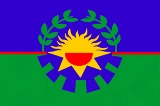
Carlos Casares
Encyclopedia
- For the town of the same name, see Carlos Casares, Buenos AiresCarlos Casares, Buenos AiresCarlos Casares is a town in Buenos Aires Province, Argentina. It is the head town of the Carlos Casares Partido.-History:...
.
Carlos Casares (February 13, 1830 — May 2, 1883) was an Argentine rancher, executive, and politician.
Life and times
Carlos Gumersindo Casares was born to Gervasia Rodríguez Rojo and Vicente CasaresVicente Casares
Vicente Casares is a village in the Cañuelas Partido of Buenos Aires Province in Argentina....
, in 1830. His father, born in Vizcaya
Vizcaya
Vizcaya may refer to:* Biscay, a Basque region and a province of Spain ** Biscay , related senses** Vizcaya ** Vizcaya Bridge, a transporter bridge in Biscay...
, Spain
Spain
Spain , officially the Kingdom of Spain languages]] under the European Charter for Regional or Minority Languages. In each of these, Spain's official name is as follows:;;;;;;), is a country and member state of the European Union located in southwestern Europe on the Iberian Peninsula...
, served as the first Spanish Consul to Argentina. His parents became influential ranchers in Argentina, and he studied in Germany
Germany
Germany , officially the Federal Republic of Germany , is a federal parliamentary republic in Europe. The country consists of 16 states while the capital and largest city is Berlin. Germany covers an area of 357,021 km2 and has a largely temperate seasonal climate...
.
Casares became a vocal opponent of Buenos Aires Province
Buenos Aires Province
The Province of Buenos Aires is the largest and most populous province of Argentina. It takes the name from the city of Buenos Aires, which used to be the provincial capital until it was federalized in 1880...
Governor Juan Manuel de Rosas
Juan Manuel de Rosas
Juan Manuel de Rosas , was an argentine militar and politician, who was elected governor of the province of Buenos Aires in 1829 to 1835, and then of the Argentine Confederation from 1835 until 1852...
, and he was jailed for a time. Following the strongman's fall at the 1852 Battle of Caseros
Battle of Caseros
The Battle of Caseros was fought near the town of Caseros, more precisely between the present-day train stations of Caseros and Palomar in Buenos Aires Province, Argentina, on 3 February 1852, between the Army of Buenos Aires commanded by Juan Manuel de Rosas...
, he entered politics, and in 1857, was elected to the Provincial Legislature. He bred racehorses in subsequent years, and became a member of the board of the Buenos Aires Western Railway
Buenos Aires Western Railway
The Buenos Aires Western Railway was one of the Big Four broad gauge British-owned companies that built and operated railway networks in Argentina...
. He married María Josefa Martínez de Hoz, the daughter of prominent landowners, and had one son.
He affiliated himself with Adolfo Alsina
Adolfo Alsina
Adolfo Alsina Maza was an Argentine lawyer and Unitarian politician, and one of the founders of the Partido Autonomista and the National Autonomist Party.-Biography:...
's Buenos Aires-centric Autonomist Party, and in 1875, the party's standard-bearer, President Nicolás Avellaneda
Nicolás Avellaneda
Nicolás Remigio Aurelio Avellaneda Silva was an Argentine politician and journalist, and president of Argentina from 1874 to 1880. Avellaneda's main projects while in office were banking and education reform, leading to Argentina's economic growth...
, appointed Casares Governor of Buenos Aires; the appointment of Casares, a moderate, contributed to an improvement in relations with provincial Caudillo
Caudillo
Caudillo is a Spanish word for "leader" and usually describes a political-military leader at the head of an authoritarian power. The term translates into English as leader or chief, or more pejoratively as warlord, dictator or strongman. Caudillo was the term used to refer to the charismatic...
s from the hinterland, and fomented national unity.
Casares enacted the Law of Common Education, a precursor to the Argentine Law 1420
Argentine Law 1420
The Law 1420 of General Common Education of Argentina was a landmark national law that dictated public compulsory, free and secular education. It was passed in 1884 during the administration of President Julio Argentino Roca, after a number of similar laws of provincial scope and the conclusions of...
of 1884, which mandated universal, compulsory, free and secular education
Education in Argentina
Education in Argentina is a responsibility shared by the national government, the provinces and federal district and private institutions, though basic guidelines have historically been set by the Ministry of Education...
. He stepped down in 1878 upon the election of separatist Carlos Tejedor
Carlos Tejedor
Carlos Tejedor may refer to:*Carlos Tejedor , governor of Buenos Aires *Carlos Tejedor Partido, an administrative district in Buenos Aires Province, Argentina*Carlos Tejedor, Buenos Aires, a city in Buenos Aires Province, Argentina...
. Amid resurfacing tensions, Casares headed the Autonomist Party committee that nominated General Julio Roca ahead of the 1880 presidential election.
Casares was appointed Director of the Bank of the Province of Buenos Aires
Bank of the Province of Buenos Aires
The Bank of the Province of Buenos Aires is a publicly-owned Argentine bank and the second-largest in the nation, by value of assets and deposits.-History:...
in 1882, and died at his Magdalena
Magdalena, Buenos Aires
Magdalena is a town in Buenos Aires Province, Argentina. It is the head town of the Magdalena Partido.Founded in 1611, the hamlet grew slowly until the late nineteenth century. The Parish of Santa María Magdalena , consecrated in 1776, inaugurated its current temple in 1860...
ranch in 1883.

